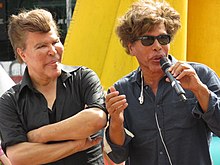
The Bogdanov affair was an academic dispute over the legitimacy of the doctoral degrees obtained by French twins Igor and Grichka Bogdanov[1] (alternatively spelled Bogdanoff) and a series of theoretical physics papers written by them in order to obtain degrees. The papers were published in reputable scientific journals, and were alleged by their authors to culminate in a theory for describing what occurred before and at the Big Bang.
The controversy began in 2002, with an allegation that the twins, popular celebrities in France for hosting science-themed TV shows, had obtained PhDs with nonsensical work. Rumors spread on Usenet newsgroups that their work was a deliberate hoax intended to target weaknesses in the peer review system that physics journals use to select papers for publication. While the Bogdanov brothers continued to defend the legitimacy of their work, the debate over whether it represented a contribution to physics spread from Usenet to many other internet forums, eventually receiving coverage in the mainstream media. A Centre national de la recherche scientifique (CNRS) internal report later concluded that their theses had no scientific value.
The incident prompted criticism of the Bogdanovs' approach to science popularization, led to a number of lawsuits, and provoked reflection among physicists as to how and why the peer review system can fail.